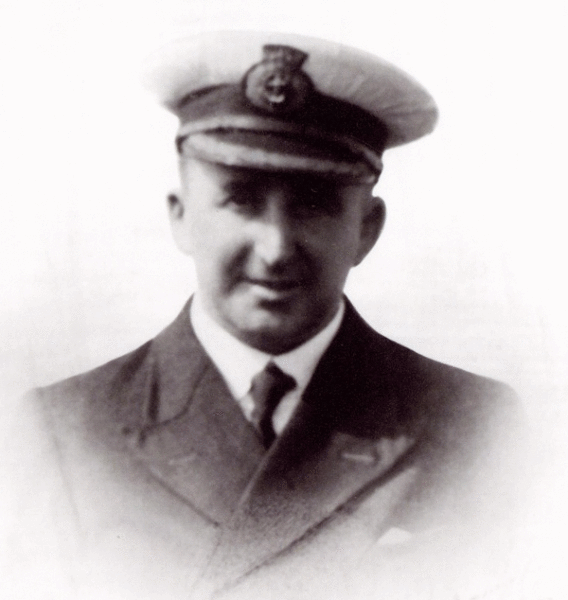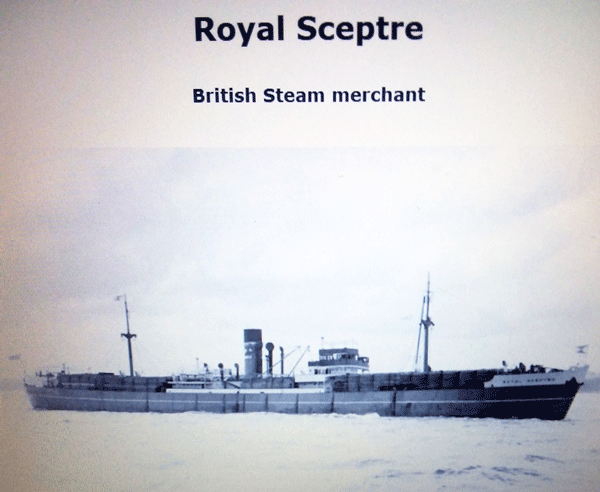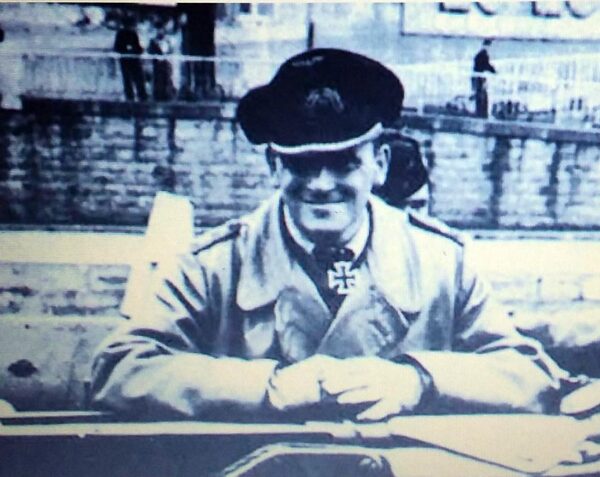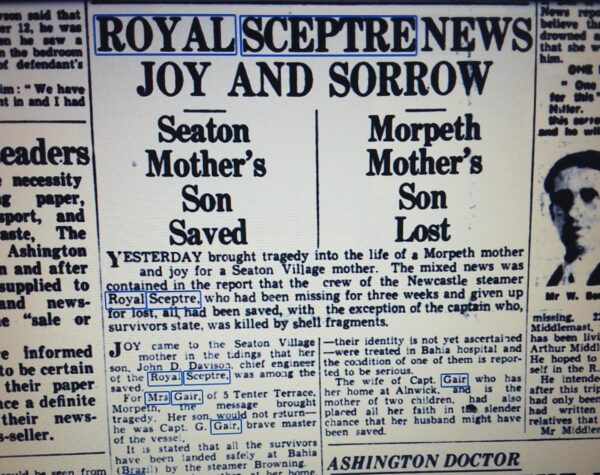
Master Mariner Captain James William Gair 1897- 1939
Died a Hero’s Death 2 days into WW2
James W Gair was captain of the British merchant ship Royal Sceptre, and died on 5th September 1939 when his unescorted vessel was attacked by a Nazi U-Boat.
James William Gair was born in South Shields, although the family originated from Nesting in Shetland Islands. He followed his father into the merchant navy and qualified as a Master Mariner in 1931.
James lived at 6 Stott Street Alnwick with his wife Alice whom he married in 1924, along with his children Hugh and Helen Gair. James and Alice had been brought up on the same street, and shared the same birthday.
In Alnwick he was well known having talked to the Duchess’ Girls School about his adventures at sea. They adopted his ship in 1937.
On September 5th, 1939, he was commanding the unescorted merchant steam ship the “Royal Sceptre”. The ship was on route from Rosario to Belfast carrying a cargo of Wheat and Maize. This was his second voyage aboard. The steam ship had been built in 1937 by J L Thompson and Sons of Newcastle upon Tyne. It was owned by Hall Bros. Company of Newcastle upon Tyne.

At 12.00 September 5th, 1939, the ship was 300 miles north of Cape Finisterre when German U boat 48 was sighted. The radio operator immediately sent out distress signals from the ship. Captain Gair tried to turn the stern of the “Royal Sceptre” in the direction of the U boat to make it a more difficult target as they were unable to escape. U boat 48 was commanded by Commander Herbert Schultze who gave the order to shoot at the top deck in order to silence the distress calls. He didn’t want his position revealed. The radio operator and Gair remained at their posts despite shells bursting all over the vessel. An eye witness reported later that Gair was seen climbing down over the railings and was killed presumably by flying shrapnel.

Captain Schultz
Nine seamen were injured in the attack, two drowned and twenty eight survived. At this point according to another eye witness the crew abandoned ship into lifeboats, but the Chief Radio Operator, Norman Hartley remained at his post. (He was eventually ordered to board the submarine and was reunited with the rest of the crew). In a later German broadcast by Herbert Schultze, he praised the “how the radio operator had acted in a brave and courageous manner.”
At 13.38 the Royal Sceptre was sunk by one torpedo from the U boat, and sank in three and a half minutes. The Petrofina and a Danish ship, Erria which were both in the area had picked up the distress signals from the Sceptre, but after a search failed to find the crew.
Herbert Schultze, in complying with the London Naval Treaty of 1930 regarding Merchant vessels ensured the crew were safely in lifeboats and checked that they had food and water with them. U 48 then proceeded towards the S.S. Browning that was in the area.
The crew of the S.S.Browning, on seeing the submarine appear panicked and abandoned their ship. Schultze ordered them in perfect English to re board their ship and to sail towards the crew of the Royal Sceptre and rescue survivors. No shots were fired with the proviso that the SS Browning did not report this to the Admiralty, which they complied with. On September 7th 1939, two days after the official start of WW2 the admiralty issued a statement that with regret they had to announce that the Royal Sceptre carrying wheat from Argentina to the UK had been intercepted and sank by a German U boat.
This event so early in the war caused Churchill to declare that this had been “an odious act of bestial piracy on the high seas”.
However, on 11th September 1939 Herbert Schultz sunk the “Firby” in exactly the same way. On doing so he sent a message to Churchill instructing him in perfect English to “save the crew of the Filby if you please “which he had just sunk”. By his actions Schultze was risking his own skin.
U boat 48 was the most successful German submarine during the first two years of the war under Schultze. Fifty seven boats were either damaged or sunk in this time, and he was lucky to survive. He did follow the rules of engagement as was the case in of the Sceptre.
Herbert Schultze went on to gain respect and have a distinguished career, being awarded the Knights Cross in Germany. Among his crew he was well like and affectionally known as “Vaddi”.
On September 7th the Ministry of Information issued a statement that the Sceptre had been sunk and the crew has abandoned ship. By 25th September the newspapers were saying that all hope was lost for the crew of the Sceptre. This was due to there being no communication from the “SS Browning” in reporting the incident. They had kept their agreement with Commander Herbert Schultze of the U boat.
This all changed when the SS Browning arrived into Bahia, Brazil on the 26th September with the surviving crew members of the Royal Sceptre.
Suddenly the family of Captain Gair- his wife Alice and his mother- along with the crew’s families hopes were all raised. For most it was the news they wanted. For Captain Gair’s wife, mother and sister waiting at home, the news was, however devastating as James had died. Alice was unable to speak to newspaper reporters at the time. Captain Gair had died at sea aged forty two.

A Newspaper Report of the Sinking
He is remembered on a Memorial at Tower Hill Memorial, section 6. His name is on the Roll of Honour 1914-1945 for shipping and Seamen.
Alice Gair died in September 1963 at her home Dovecote Cottage and is buried in Alnwick Cemetery. James’s name appears on the family gravestone as having been killed in action.

